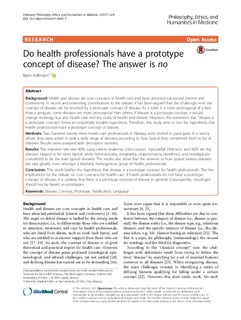| dc.contributor.author | Hofmann, Bjørn | |
| dc.date.accessioned | 2018-01-15T14:38:35Z | |
| dc.date.available | 2018-01-15T14:38:35Z | |
| dc.date.created | 2017-12-27T14:55:39Z | |
| dc.date.issued | 2017 | |
| dc.identifier.citation | Philosophy Ethics and Humanities in Medicine. 2017, 12:6. | nb_NO |
| dc.identifier.issn | 1747-5341 | |
| dc.identifier.uri | http://hdl.handle.net/11250/2477627 | |
| dc.description.abstract | Background
Health and disease are core concepts in health care and have attracted substantial interest and controversy. In recent and interesting contributions to the debate it has been argued that the challenges with the concept of disease can be resolved by a prototype concept of disease. As a robin is a more prototypical of a bird than a penguin, some diseases are more prototypical than others. If disease is a prototype concept, it would change nosology, but also health care and the study of health and disease. However, the statement that “disease is a prototype concept” forms an empirically testable hypothesis. Therefore, this study aims to test the hypothesis that health professionals have a prototype concept of disease.
Methods
Two hundred twenty-three health care professionals in Norway were invited to participate in a survey where they were asked to rank a wide range of diseases according to how typical they considered them to be as diseases. Results were analysed with descriptive statistics.
Results
The response rate was 90%. Lung cancer, leukemia, colon cancer, myocardial infarction, and AIDS are the diseases ranged to be most typical, while homosexuality, pregnancy, drapetomania, dissidence, and nostalgia are considered to be the least typical diseases. The results also show that the answers to how typical various diseases are vary greatly, even amongst a relatively homogenous group of health professionals.
Conclusion
This study falsifies the hypothesis that disease is a prototype concept for health professionals. This has implications for the debate on core concepts for health care. If health professionals do not have a prototype concept of disease, it is unlikely that there is a prototype concept of disease in general. Consequently, nosologies should not be based on prototypes. | nb_NO |
| dc.language.iso | eng | nb_NO |
| dc.publisher | BioMed Central | nb_NO |
| dc.rights | Navngivelse 4.0 Internasjonal | * |
| dc.rights.uri | http://creativecommons.org/licenses/by/4.0/deed.no | * |
| dc.title | Do health professionals have a prototype concept of disease? The answer is no | nb_NO |
| dc.type | Journal article | nb_NO |
| dc.type | Peer reviewed | nb_NO |
| dc.description.version | publishedVersion | nb_NO |
| dc.source.volume | 12 | nb_NO |
| dc.source.journal | Philosophy Ethics and Humanities in Medicine | nb_NO |
| dc.source.issue | 1 | nb_NO |
| dc.identifier.doi | 10.1186/s13010-017-0047-7 | |
| dc.identifier.cristin | 1532147 | |
| dc.description.localcode | © The Author(s). 2017 Open Access This article is distributed under the terms of the Creative Commons Attribution 4.0 International License (http://creativecommons.org/licenses/by/4.0/), which permits unrestricted use, distribution, and reproduction in any medium, provided you give appropriate credit to the original author(s) and the source, provide a link to the Creative Commons license, and indicate if changes were made. | nb_NO |
| cristin.unitcode | 194,65,70,0 | |
| cristin.unitname | Institutt for helsevitenskap Gjøvik | |
| cristin.ispublished | true | |
| cristin.fulltext | postprint | |
| cristin.qualitycode | 1 | |

